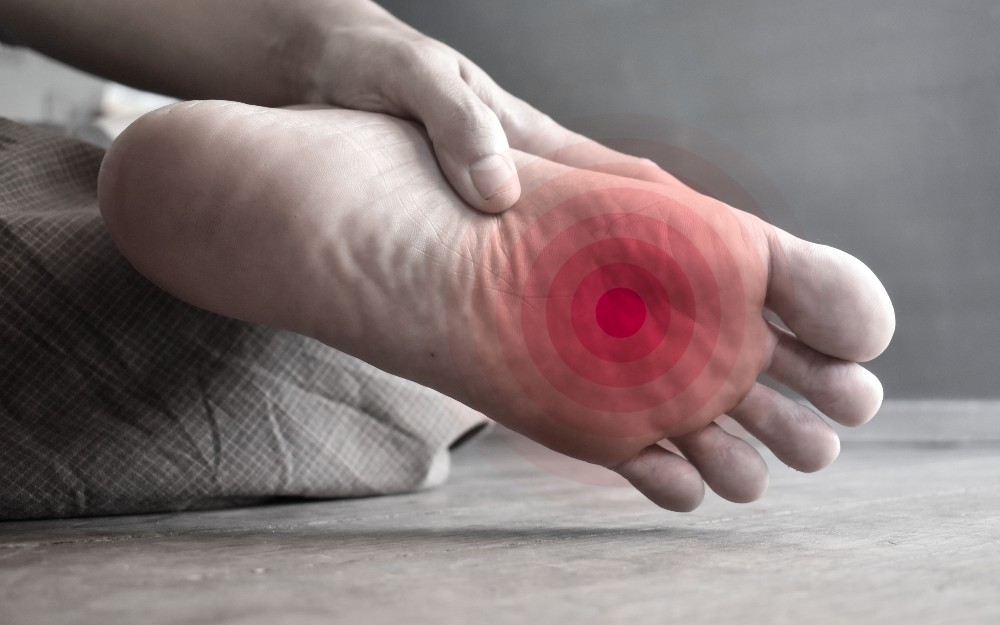Peripheral Neuropathy
Peripheral neuropathy is serious and can even be a dangerous nerve issue that often develops gradually over time which is a common condition we see in our office.
The peripheral nervous system works as a messenger to send sensation signals (pain, pleasure, etc.) from your body to your brain. Your brain then interprets these messages and lets you know what is happening. This is an important job because if you are in pain, then you can address whatever is causing it to avoid any harm to your body.
However, when peripheral neuropathy occurs, this becomes very difficult for the nerves to do. And this is where things can become dangerous. If the nerves have been damaged or destroyed by an underlying cause, you may begin to feel increasingly severe pain when there is nothing wrong or not feel the pain when a serious problem occurs.
If you believe you may be developing peripheral neuropathy—even if the symptoms do not yet seem severe—it is critical that you receive expert care and an evaluation from an expert as soon as possible. Our team at Capital Podiatry Associates is exceptionally qualified to diagnose and treat your peripheral neuropathy to keep you as active, pain-free, and safe as possible.
What are the Symptoms of Peripheral Neuropathy?
Symptoms often vary depending on location, severity, and the foot and ankle nerves that are being affected. The most common signs of peripheral neuropathy include:
- Burning or tingling sensations
- Cramping or muscle tightness
- Nerve pain
- Numbness
It’s important to understand that neuropathy often develops slowly, and if left unaddressed, it tends to follow a typical pattern.
In the early stages, you might only feel occasional episodes of mild pain or tingling, then go a long between episodes. As time goes on, the pain becomes more constant and severe. As time goes on, the nerves become sufficiently damaged, and the pain goes away and is replaced by numbness.
Numbness is the most concerning symptom of peripheral neuropathy. Though you may be happy the pain is gone, lacking sensation in your feet and ankles means that you are much more likely to develop more serious wounds and injuries—ones that, left unchecked, could ultimately require amputation.
What Causes Peripheral Neuropathy?
Unmanaged diabetes is the most common cause of peripheral neuropathy. Diabetes can cause stress on your body because of high blood sugar levels and high blood pressure. This makes it crucial to manage diabetes by maintaining low blood sugar levels and a weight healthy range.
Diabetes can be the main cause, but it is not the only cause of neuropathy. Other risk factors for peripheral neuropathy, include:
- Arthritis
- Chemotherapy
- Chronic inflammation
- Heredity
- Hypothyroidism
- Kidney disease
- Vitamin deficiency
Foot and ankle injuries are another common cause of neuropathy. Other reasons this condition can develop include exposure to toxins, autoimmune diseases, and certain kinds of medication.
How is Peripheral Neuropathy Managed and Treated?
Our team will diagnose the severity and root causes of your peripheral neuropathy. During treatment, we will help build a comprehensive treatment plan that can help you slow and/or stop the progression of the nerve damage to restore as much nerve function as possible.
Lifestyle changes are a foundational aspect of almost any treatment plan. This includes things like:
- Manage underlying conditions (e.g. diabetes)
- Creating a healthy diet plan
- Regular exercise (we can help you develop a routine that minimizes the risk of foot injuries and wounds)
- Regular foot inspections, at least once per day, and call us at the first sign of trouble
These lifestyle changes may not be enough for those who have reached the later stages of peripheral neuropathy. For situations like these, our office provides further advanced treatment options that may include:
- Laser therapy uses light energy to help relieve pain and create a healing environment for the peripheral nerves.
- Therapeutic nerve blocks use injected anesthetic into the specific nerves causing severe pain to provide relief.
- Peripheral nerve surgery to decompress nerves that may be damaged due because of pressure or obstruction by other structures in the foot and ankle.
Capital Podiatry Associates Offers Expert Peripheral Neuropathy Care
Neuropathy is a progressive condition and existing nerve damage can be extremely difficult to reverse. This does not mean your case of neuropathy is hopeless—we have managed to provide significant relief and a return to activity for many patients.
However, it does mean you should never delay seeking treatment! The earlier you commit to your comprehensive treatment plan, the better your long-term outlook for neuropathy can be.
To request an appointment with the team at Capital Podiatry Associates in Alexandria, VA, call us at (703) 560-3773 or contact us online.

